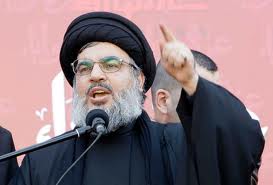 The leader of Lebanon’s Hezbollah movement made a rare public appearance at a Beirut rally on Tuesday to mark the Shiite holy day of Ashoura, saying his militant group is acquiring more weapons and members every day.
The leader of Lebanon’s Hezbollah movement made a rare public appearance at a Beirut rally on Tuesday to mark the Shiite holy day of Ashoura, saying his militant group is acquiring more weapons and members every day.
Sheik Hassan Nasrallah said Hezbollah was “here to stay” and would never compromise on its weapons.
The group’s weapons are a contentious issue in Lebanon. Hezbollah insists it needs to maintain its powerful arsenal to ward off any threat from Israel but the weapons also make it the most potent military force in Lebanon — far stronger than even the national army.
“We are growing in numbers, our training is getting better and our weapons are increasing,” Nasrallah said. “And for those who are betting that our weapons are rusting, we say that our weapons are being renewed.”
Nasrallah has rarely been seen in public since his Shiite Muslim group battled Israel in a monthlong war in 2006, fearing Israeli assassination. Since then, he has communicated with his followers and gives news conference mostly via satellite link.
But on Tuesday, the black-turbaned Nasrallah was seen walking through a throng of people in a southern Shiite stronghold in Beirut and then greeted crowds from the podium.
“I wanted to be with you for few minutes … to renew our pledge and for the world to hear us,” Nasrallah said.
His public appearance, he said, was a message to those who believe they can “threaten us,” he added, as many in the crowds shouted “Death to America” and “Death to Israel.”
He then left the podium, smiling and telling tens of thousands of supporters he will reappear in few minutes on a giant screen for a longer speech. “See you in few minutes … don’t go away,” he joked to his followers before he left.
Nasrallah’s appearance is meant to portray confidence at a time of upheaval in the Middle East and particularly in Syria, which along with Iran is Hezbollah’s backer.
Syrians and Arabs around the region have in recent years elevated Nasrallah to the status of a nationalist hero after his guerrillas’ 2006 war with Israel.
Since the Syrian uprising, however, Syrians have unleashed their anger at Hezbollah over its blunt support for the regime of President Bashar Assad. Some protesters in Syria have set fire to the yellow flag of Hezbollah and pictures of Nasrallah.
Nasrallah reiterated his support for Assad’s regime on Tuesday, accusing the United States of seeking to destroy Syria “to make up for its defeat in Iraq.”
He accused some in the Syrian opposition of catering to U.S. agendas in Syria and the region, and called on protesters to realize that they were being “used” for the wider aim of striking at Assad’s regime for its support for Hezbollah and other anti-Israel groups in the region.
Ashoura is one of the holiest days of the Muslim Shiite calendar. It marks the anniversary of the death in the seventh century of the Prophet Muhammad’s grandson Imam Hussein. His death in a battle outside of the Iraqi city of Karbala sealed Islam’s historical Sunni-Shiite split, which still bedevils the Middle East.
Photo: Hezbollah leader Sheik Hassan Nasrallah speaks to the crowd in a rare public appearance during a rally to mark the Muslim holy day of Ashoura, in the Hezbollah stronghold of south Beirut, Lebanon, on Tuesday Dec. 6, 2011. Sheik Hassan Nasrallah has rarely been seen in public since his Shiite Muslim group battled Israel in a monthlong war in 2006, fearing Israeli assassination. Since then, he has communicated with his followers and gives news conference mostly via satellite link. Ashoura marks the anniversary of the death in the seventh century of the Prophet Muhammad’s grandson Imam Hussein. His death in a battle outside of the Iraqi city of Karbala sealed Islam’s historical Sunni-Shiite split, which still bedevils the Middle East. Ashoura is one of the holiest days of the Muslim Shiite calendar.

Leave a Reply
You must be logged in to post a comment.